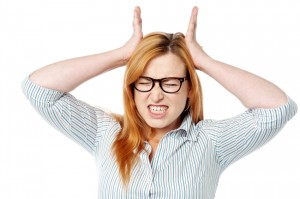 A 2005 survey conducted by the Children’s Hospital Boston Dental Clinic collected data on childhood bruxism (teeth grinding and clenching) from nearly 900 families. 38% of these families reported having children that engaged in night-time teeth grinding and clenching. Children whose parents brux were 1.8% more likely to engage in night-time bruxism. A 2013 study revealed that 5% of the population reported experiencing night-time bruxism, and 10% reported diurnal (day time) teeth clenching and grinding. However, day time bruxism may simply be more easily diagnosed than night time bruxism rather than more common. Bruxism is a fairly common problem with numerous causes, and appropriate treatments are almost as varied as these causes. It’s essential for patients who brux to seek appropriate treatment since bruxism causes or worsens numerous oral health concerns including dental wear, chips, cracks, damaged restorations, and TMJ disorder. If you experience day or night time bruxism, don’t hesitate to contact your South Shore Dental Care team for treatment recommendations.
A 2005 survey conducted by the Children’s Hospital Boston Dental Clinic collected data on childhood bruxism (teeth grinding and clenching) from nearly 900 families. 38% of these families reported having children that engaged in night-time teeth grinding and clenching. Children whose parents brux were 1.8% more likely to engage in night-time bruxism. A 2013 study revealed that 5% of the population reported experiencing night-time bruxism, and 10% reported diurnal (day time) teeth clenching and grinding. However, day time bruxism may simply be more easily diagnosed than night time bruxism rather than more common. Bruxism is a fairly common problem with numerous causes, and appropriate treatments are almost as varied as these causes. It’s essential for patients who brux to seek appropriate treatment since bruxism causes or worsens numerous oral health concerns including dental wear, chips, cracks, damaged restorations, and TMJ disorder. If you experience day or night time bruxism, don’t hesitate to contact your South Shore Dental Care team for treatment recommendations.
What Causes Bruxism?
The causes of bruxism are as unique as those who suffer from the disorder. However, some of the most common include:
- Stress/Anxiety – 70% of patients who brux indicate stress is the main cause. This is especially true for patients who experience day time bruxism.
- Sleep disorder – patients with sleep apnea, hypersomnia, somnambulism, and other sleep disorders are more likely to brux at night than those with no other sleep problems.
- Genetic predisposition – children with parents who brux are 1.8% more likely to brux.
- Alcohol, tobacco, caffeine consumption – these items as well as high sugar diets, eating too close to sleep, and acid reflux have all been indicated as causing or exacerbating day and night time bruxism.
- Medication – certain anti-depressants cause day and night time teeth grinding and clenching.
- Brain injury – traumatic head injuries have numerous side effects, and one common effect is day and night time bruxism.
- Dental problems – misaligned bite can cause patients to incorrectly position teeth clenching and grinding them together due to irregularities in the way teeth fit together.
How is Bruxism Treated?
Treatments for bruxism often depend on the type (night or day) and cause. For instance, patients who experience bruxism caused by anti-depressants may simply need to switch medications. Those who experience stress-related bruxism are often helped by reducing stress, engaging in stress reliving exercises, and other cognitive behavioral interventions. Some patients may wish to utilize a mouthguard. This is especially true for patients who unconsciously grind and clench teeth as other behavioral interventions can be difficult. Our Massapequa Park dentist and team can help you determine the right treatment option for you.
Find Out More about Teeth Grinding and Clenching
Teeth grinding and clenching often begins in childhood, but the potential damage to teeth, jaw, and soft tissue can be detrimental to oral health. At South Shore Dental Care, we assist patients in determining the cause of their bruxism, and finding an appropriate treatment option. If you’re in need of treatment for chronic day or night time bruxism, contact our Massapequa Park dentist and team today.
